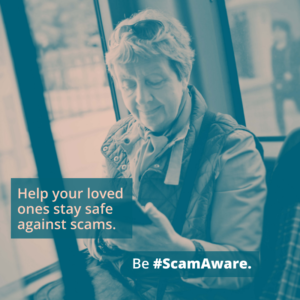Don’t miss a trick – Be #scamaware
B e Scam Aware!
e Scam Aware!
Scams can affect anyone, at any age, and happen online or in person. Lots of us are facing higher
bills and worrying about money, and scammers are trying to take advantage of this.
Examples of scams are someone:
• Pretending to be an energy company offering too good to be true deals on gas or electricity costs, in person or online
• Doing work on your house or garden that you didn’t ask for or agree to, and then demanding payment
How can I spot scams?
- Someone you don’t know contacts you unexpectedly
- You’re being urged to respond quickly so you don’t get time to think about it
- You’ve been asked to pay for something urgently
- You’ve been asked to give away personal information
- Be suspicious. Scammers can appear like a trusted business or government official, have a professional website and say all the right things.
- Take your time to work out if, this is a real organisation. Ask them for ID or contact the organisation on an official phone number
How can I protect myself:
- Don’t rush into making decisions. If someone pressures you, it’s probably a scam
- Never give money or personal details, like passwords or bank details, to anyone you don’t know, trust or have only met online
- Pay by debit or credit card. This gives you extra protection if things go wrong
- Before you buy anything, check the company or website you’re using. Read reviews from different websites, search for the company’s details on Companies House, and take a look at their terms and conditions
What can I do if I’ve been scammed?
- Tell your bank straight away. They may be able to help you get your money back
- Protect yourself by changing your online passwords and checking your computer for viruses
- Report the scam.
Call the Citizens Advice consumer service if you need support: 0808 223 1133 (England)
We’ll report it to Trading Standards, and can offer further advice.
Report the scam to Action Fraud: 0300 123 2040
You can read all our scams advice here: citizensadvice.org.uk/ScamsAdvice
